Adams Charles Francis
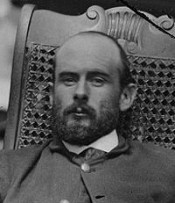
Charles Francis Adams, Jr. (May 27, 1835 – May 20, 1915) was a member of the prominent Adams family, and son of Charles Francis Adams, Sr.. He served as a colonel in the Union Army during the American Civil War and was a railroad executive following the war. Adams was born into a family with a long legacy in American public life. He was the great-grandson of United States President John Adams, and the grandson of president John Quincy Adams. His father Charles Francis Adams, Sr.[1] was a lawyer, politician, diplomat, and writer. After graduating from Harvard University in 1856, Adams served on the Union side in the American Civil War, serving initially as a captain in a Massachusetts cavalry regiment. He fought with distinction during the Gettysburg Campaign, where his company was heavily engaged at the Battle of Aldie. He received the brevet rank of brigadier-general in the Regular Army in 1865. On 8 May 1865, he married Mary Elizabeth [Ogden]; daughter of Abram Ogden of New York City, NY. The couple had three daughters and two twin sons: Mary Ogden ("Molly") Adams, Louisa Catherine Adams, Elizabeth Ogden ("Elise") Adams, John Adams (b. 1875 - 1964), and Henry Adams (b. 1875 - 1951), both of whom graduated Harvard in 1898.[2][3][4] Following the Civil War, he was appointed to the Massachusetts Railroad Commission. There he attempted to persuade (rather than coerce) railroads into compliance with accepted business norms. Thomas McCraw called Adams's approach to regulation "the Sunshine Commission" since the purpose of the commission was to expose the corrupt business practices in hopes that, once out in the open, the businessmen would be shamed into mending their ways. It was in this vein that he wrote Chapters of Erie. However, true to his regulatory philosophy, he favored the protection of businessmen over that of the consumers. He saw regulation as necessary to protect investors and other businessmen from the capriciousness of a hostile public or the machinations of other unscruplous stock jobbers.[5] Adams was president of the Union Pacific Railroad from 1884 to 1890, having previously become widely known as an authority on the management of railways. Among his writings are Railroads, Their Origin and Problems (1878). His siblings include: older sister Louisa Catherine [Adams], wife of Charles Kuhn, of Philadelphia, older brother [Hon.] John Quincy Adams II; the father of Charles Adams, III, the historian Henry Brooks Adams[2], Arthur Adams, who died young during their childhood, Mary Adams, who married Henry Parker Quincy, of Dedham, MA, and historian (Peter Chardon Brooks Adams), of Beverly Farms, MA. who married Evelyn [Davis]. Charles F. Adams, Jr. died May 20, 1915, a week shy of his 80th birthday. He is buried in Mount Wollaston Cemetery Quincy, Massachusetts. His grave can be found in the Old Section, Lot 337. A White · Bancroft · Winsor · Poole · CK Adams · Jay · Henry · Angell · H Adams · Hoar · Storrs · Schouler · Fisher · Rhodes · Eggleston · CF Adams · Mahan · Lea · Smith · McMaster · Baldwin · Jameson · G Adams · Hart · Turner · Sloane · Roosevelt · Dunning · McLaughlin · Stephens · Burr · Ford · Thayer · Channing · Jusserand · Haskins · Cheyney · Wilson · Andrews · Munro · Taylor · Breasted · Robinson · Greene · Becker · Bolton · Beard · Dodd · Rostovtzeff · McIlwain · Ford · Larson · Ferguson · Farrand · Thompson · Schlesinger · Neilson · Westermann · Hayes · Fay · Wertenbaker · Latourette · Read · Morison · Schuyler · Randall · Gottschalk · Curti · Thorndike · Perkins · Langer · Webb · Nevins · Bemis · Bridenbaugh · Brinton · Boyd · Lane · Nichols · Holborn · Fairbank · Woodward · Palmer · Potter · Cochran · L White · Hanke · Wright · Morris · Gibson · Bouwsma · Franklin · Pinkney · Bailyn · Craig · Curtin · Link · McNeill · Degler · Davis · Iriye · Harlan · Herlihy · Leuchtenburg · Wakeman · Tilly · Holt · Coatsworth · Bynum · Appleby · Miller · Darnton · Foner · Louis · Hunt · McPherson · Spence · Sheehan · Kerber · Weinstein · Spiegel
do you like this author?
What readers are saying
What do you think? Write your own comment on this book!
write a commentWhat readers are saying
What do you think? Write your own comment on this author!
write a commentBook list

Some Phases of Sexual Morality and Church Discipline in Colonial New England
Series:
Unknown
Year:
Unknown
Raiting:
4.5/5
Show more
add to favoritesadd In favorites

"Imperialism" and "The Tracks of Our Forefathers"
Series:
Unknown
Year:
Unknown
Raiting:
4/5
Show more
add to favoritesadd In favorites

"'Tis Sixty Years Since"
Address of Charles Francis Adams; Founders' Day,January 16,1913
Series:
Unknown
Year:
Unknown
Raiting:
3.5/5
Show more
add to favoritesadd In favorites
Book list

Some Phases of Sexual Morality and Church Discipline in Colonial New England
Series:
Unknown
Year:
Unknown
Raiting:
4.5/5
Show more
add to favoritesadd In favorites

"Imperialism" and "The Tracks of Our Forefathers"
Series:
Unknown
Year:
Unknown
Raiting:
4/5
Show more
add to favoritesadd In favorites

"'Tis Sixty Years Since"
Address of Charles Francis Adams; Founders' Day,January 16,1913
Series:
Unknown
Year:
Unknown
Raiting:
3.5/5
Show more
add to favoritesadd In favorites

charles francis adams 1835 1915 an autobiography
Series:
Unknown
Year:
Unknown
Raiting:
3/5
This volume is produced from digital images created through the University of Michigan University Library's large-scale digitization efforts. The Library seeks to preserve the intellectual content of items in a manner that facilitates and promotes a variety of uses. The digital reformatting process results in an electronic version of the original text that can be both accessed online and used to create new print copies. The Library also understands and values the usefulness of print and makes reprints available to the public whenever possible. This book and hundreds of thousands of others can be found in the HathiTrust, an archive of the digitized collections of many great research libraries. For access to the University of Michigan Library's digital collections, please see http://www.lib.umich.edu and for information about the HathiTrust, please visit http://www.hathitrust.org
Show more
add to favoritesadd In favorites
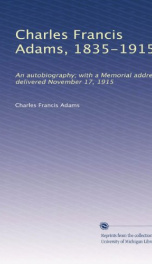
charles francis adams 1835 1915 an autobiography with a memorial address de
Series:
Unknown
Year:
Unknown
Raiting:
4.5/5
This volume is produced from digital images created through the University of Michigan University Library's large-scale digitization efforts. The Library seeks to preserve the intellectual content of items in a manner that facilitates and promotes a variety of uses. The digital reformatting process results in an electronic version of the original text that can be both accessed online and used to create new print copies. The Library also understands and values the usefulness of print and makes reprints available to the public whenever possible. This book and hundreds of thousands of others can be found in the HathiTrust, an archive of the digitized collections of many great research libraries. For access to the University of Michigan Library's digital collections, please see http://www.lib.umich.edu and for information about the HathiTrust, please visit http://www.hathitrust.org
Show more
add to favoritesadd In favorites
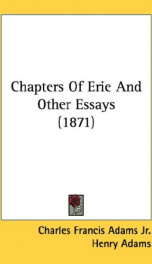
chapters of erie and other essays
Series:
Unknown
Year:
Unknown
Raiting:
3/5
Originally published in 1871. This volume from the Cornell University Library's print collections was scanned on an APT BookScan and converted to JPG 2000 format by Kirtas Technologies. All titles scanned cover to cover and pages may include marks notations and other marginalia present in the original volume.
Show more
add to favoritesadd In favorites

before and after the treaty of washington the american civil war and the war i
Series:
Unknown
Year:
Unknown
Raiting:
4.5/5
Show more
add to favoritesadd In favorites

an address on the occasion of opening the new town hall in braintree july 29
Series:
Unknown
Year:
Unknown
Raiting:
3.5/5
Show more
add to favoritesadd In favorites

an address on the life character and services of william henry seward delivere
Series:
Unknown
Year:
Unknown
Raiting:
3.5/5
Show more
add to favoritesadd In favorites

an address on the life character and services of william henry seward deliver
Series:
Unknown
Year:
Unknown
Raiting:
3.5/5
Show more
add to favoritesadd In favorites

an address on the life character and services of william henry seward volume 2
Series:
Unknown
Year:
Unknown
Raiting:
4.5/5
Show more
add to favoritesadd In favorites

an address on the life character and services of william henry seward volume 1
Series:
Unknown
Year:
Unknown
Raiting:
3/5
Show more
add to favoritesadd In favorites
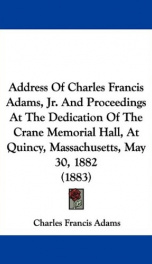
address of charles francis adams jr and proceedings at the dedication of the
Series:
Unknown
Year:
Unknown
Raiting:
4/5
Show more
add to favoritesadd In favorites

a college fetich an address delivered before the harvard chapter of the fratern
Series:
Unknown
Year:
Unknown
Raiting:
4.5/5
Show more
add to favoritesadd In favorites

a college fetich an address delivered before the harvard chapter of the frater
Series:
Unknown
Year:
Unknown
Raiting:
3/5
Show more
add to favoritesadd In favorites
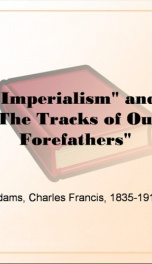
imperialism and the tracks of our forefathers
Series:
Unknown
Year:
Unknown
Raiting:
3/5
This book was converted from its physical edition to the digital format by a community of volunteers. You may find it for free on the web. Purchase of the Kindle edition includes wireless delivery.
Show more
add to favoritesadd In favorites
What readers are saying
What do you think? Write your own comment on this author!
write a commentif you like Adams Charles Francis try:
readers also enjoyed
What readers are saying
What do you think? Write your own comment on this author!
write a commentGenre
if you like Adams Charles Francis try:
readers also enjoyed
Do you want to read a book that interests you? It’s EASY!
Create an account and send a request for reading to other users on the Webpage of the book!


